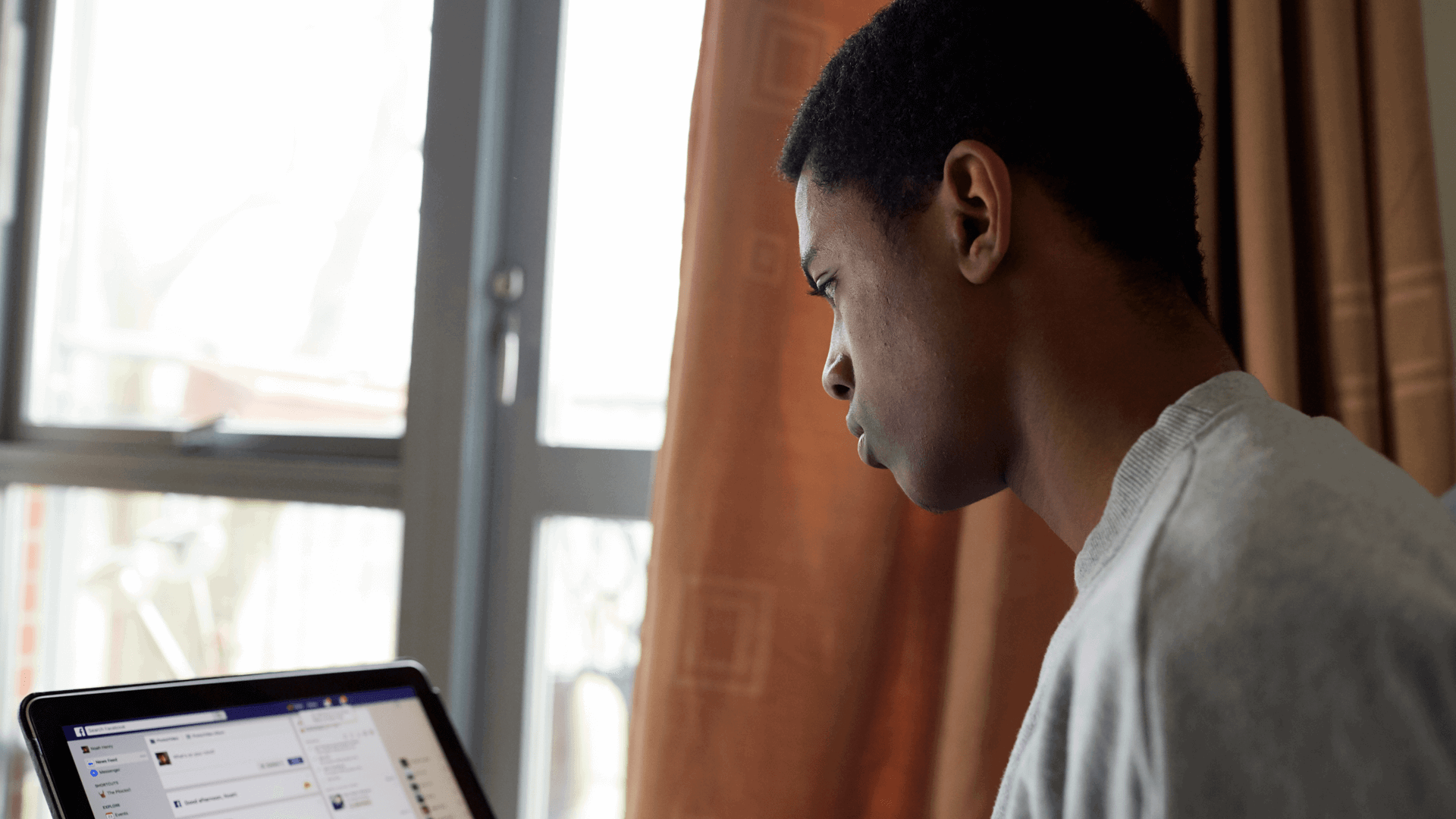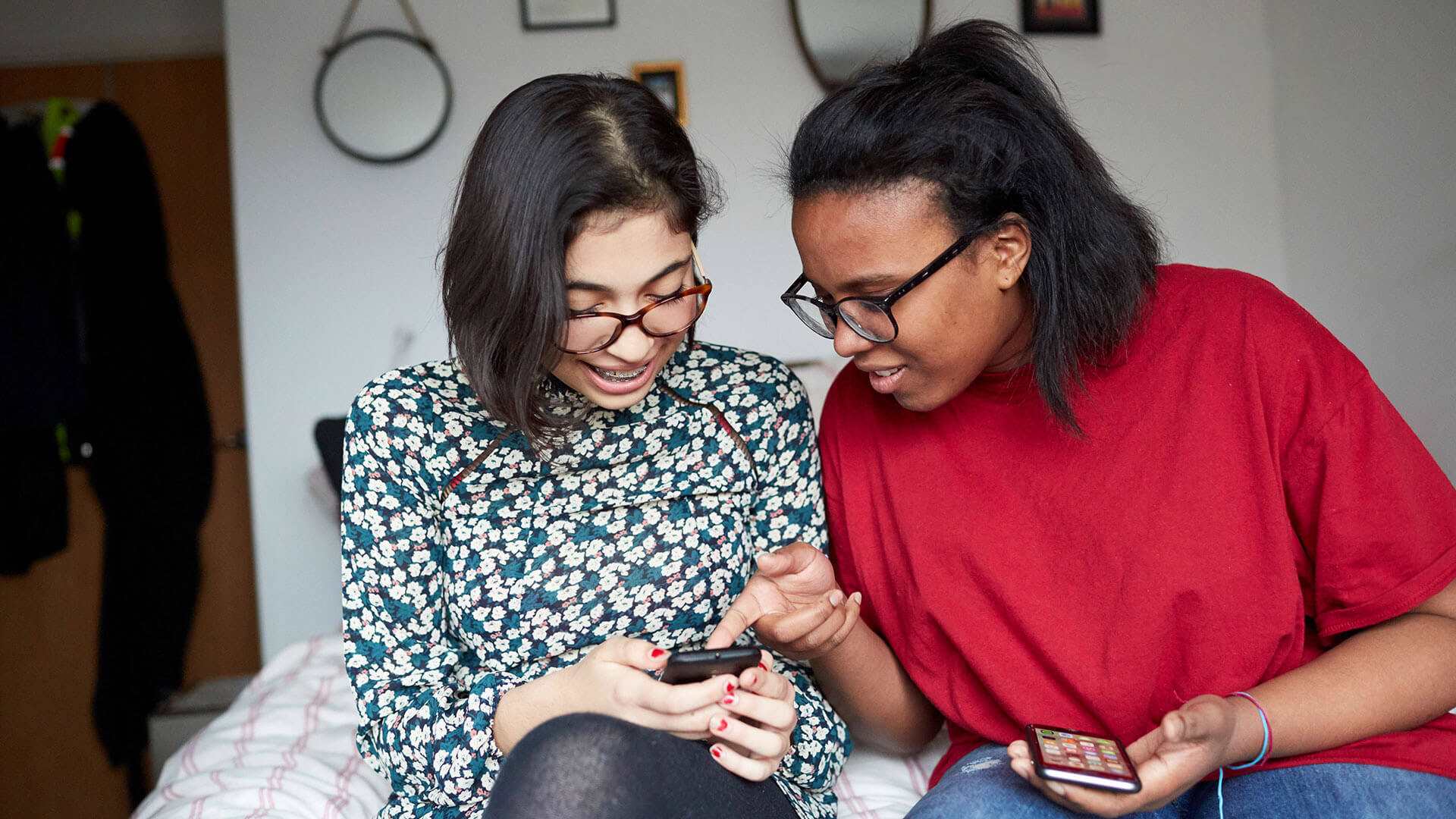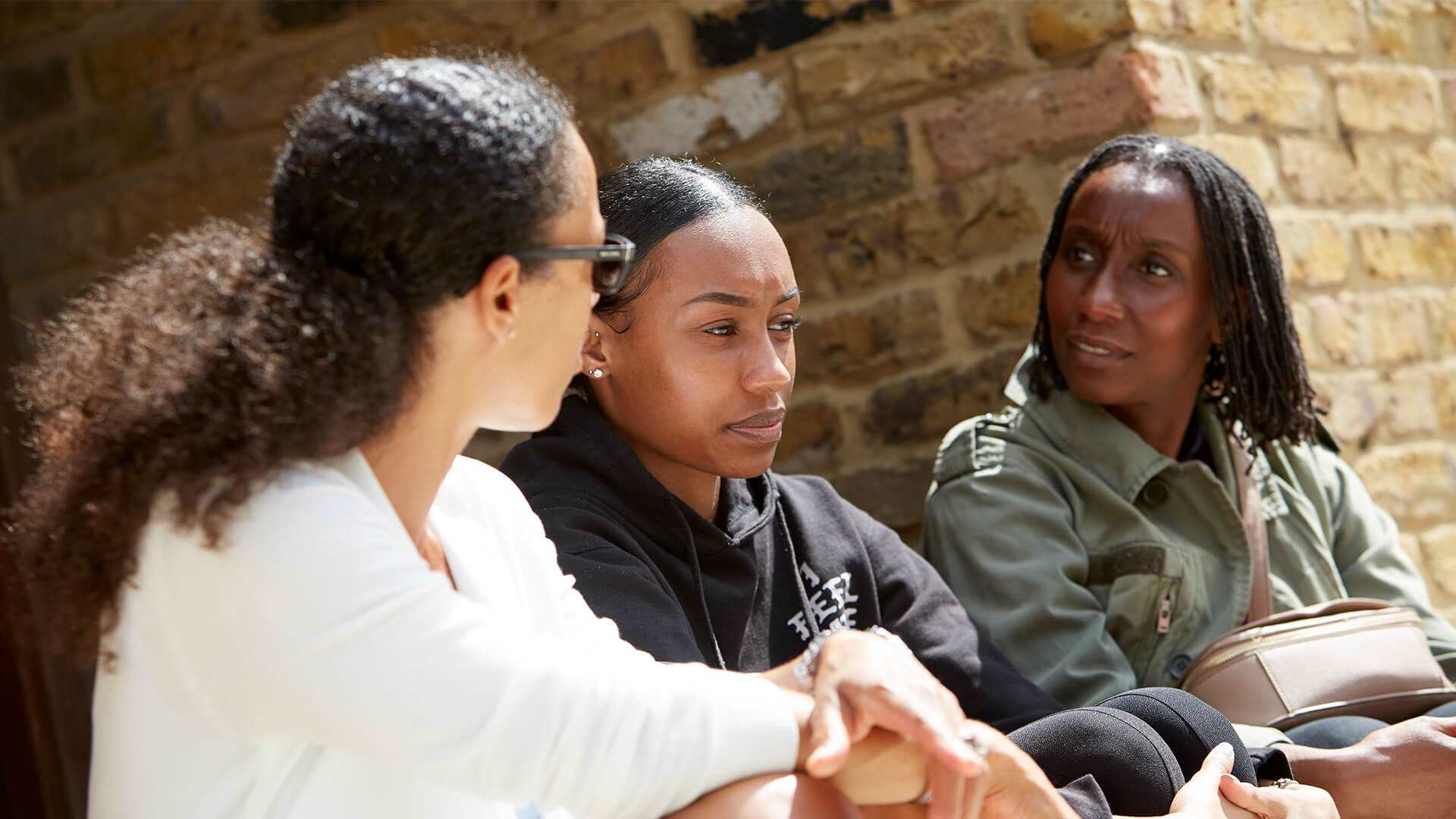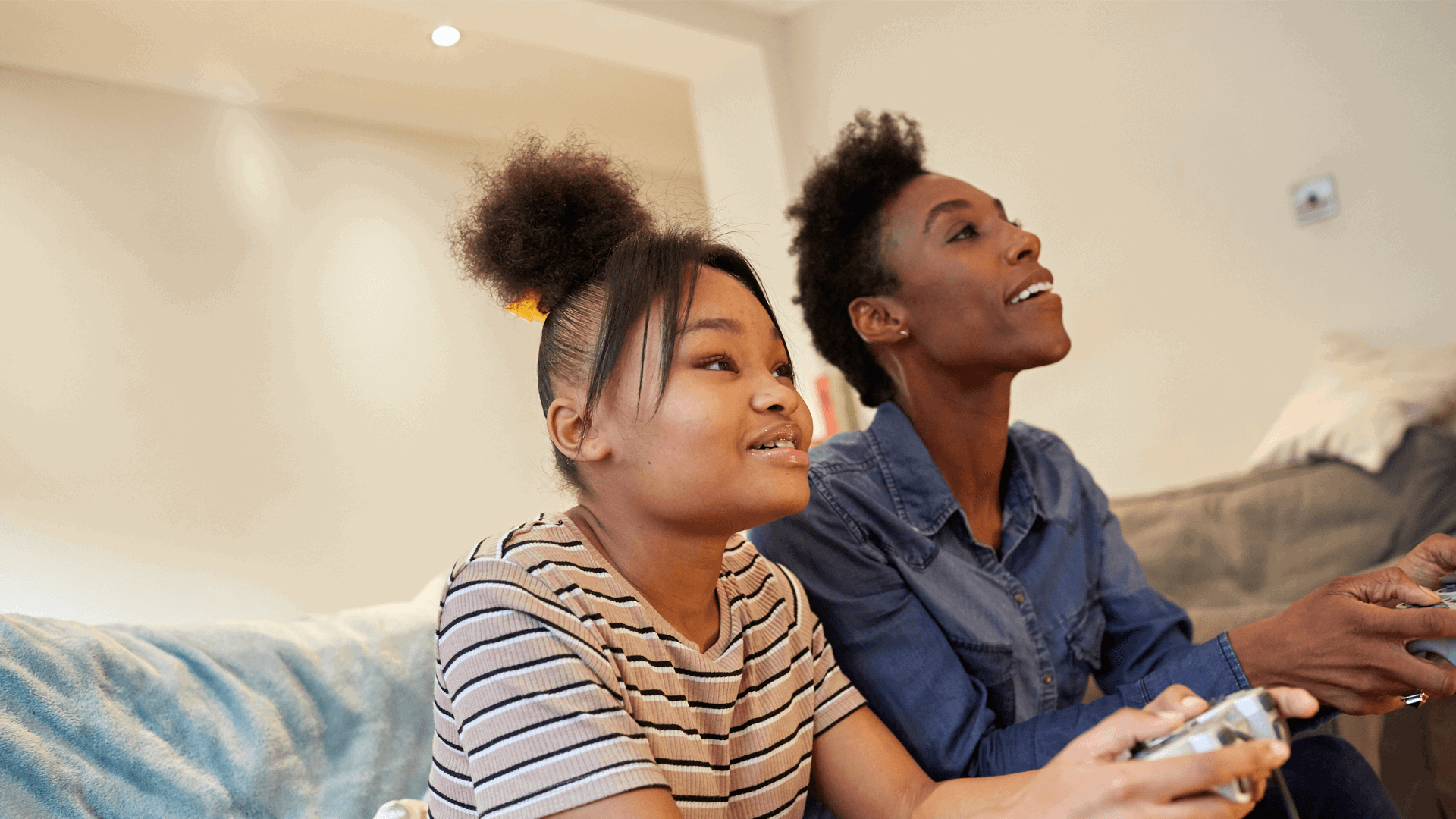Have conversations from a young age

The internet offers huge opportunities. From a young age, children have the chance to learn, research, play games, have fun and connect with family who may not live nearby. But it’s important to help them to use the online world in a way that’s safe and positive for their mental health.
That’s why it’s good to have regular conversations about the internet and social media from a young age – it should be as ordinary as talking about the weather, the dog, or something you’ve watched on TV.
You don’t need to pry or quiz your child about every website they’ve seen, but checking in with them for a minute or two can make a huge difference.
Have regular conversations about the internet and social media from a young age.
Lead by example
Talk to your child about your own experience of the online world. Show them sites and apps that you like, and explain why you like them. Show them how to use the internet in a positive way – to research things, to do homework, to talk to family, and to find out about the world. This helps them to have a critical eye.
You can also talk about your own less positive experiences online. If you feel pressured by the ‘perfect’ photos people share on social media, then being open with your child about this can be a good thing. It might help them understand that the ‘perfect’ pictures people share on social media don't always show reality. Encourage them to talk to you if they’re struggling with this.
Remember, children look to their parents as role models. For example, if you check your phone constantly at mealtimes, or play violent games in front of your children, then it’s likely your child might do the same.
Talk to your child about your own experience of the online world.
Ask your child about the apps and websites they use
It can be easy to feel that you don’t understand the latest technology, apps or social media that your child is using. But don’t use this as an excuse not to get involved.
Ask your child to teach you and show you there about their favourite apps, games or websites. This will help you understand how they work so that you can talk about the positives and whether you have any concerns. A quick Google search can also tell you a lot.
If you think anything your child is accessing is not appropriate for their age, be ready to explain why you think this. Wherever possible, make it a joint decision with your child, so they understand the reasons not to use something and will stick to it.
Ask your child to teach you about their favourite apps, games or websites.
Set boundaries - but be realistic

The boundaries you set for internet use will depend on your child's age. It’s like teaching your child to cross the road: you’ll make sure they hold your hand when they’re very young, but as they grow older you want them to assess the risks and stay safe more independently.
Whatever their age, it’s a good idea to sit down together with your child to agree some rules about how much time they spend online. For example, you might want to agree that they shouldn’t go online just before bed or use any devices at night, because this can affect their sleep. You can often set timers on devices to limit internet use – but try to help your child manage this for themselves as well.
You can also set up parental controls to stop your child from accessing harmful content online, but your child may well learn how to get round these. That’s why it’s important to make sure your child is able to make good decisions for themselves.
Sit down as a family and develop some rules about internet use.
Reassure them that they can always talk to you
Research suggests that most children are actually more cautious than adults online, and that most are good at navigating the internet safely. Often when they do come across upsetting content, it’s not because they’ve gone looking for it, but because they’ve found it by accident, or because someone’s sent it to them.
It is a good idea to reassure your child that they can always talk to you.
- Ask them if they’ve seen anything online that they are not comfortable with. (They might have seen things like nasty comments, sexual content or violent images.)
- Tell them that you won’t overreact if they tell you about something they’ve seen, that you’d much rather that they talked to you, instead of keeping it to themselves.
- If they are upset or worried about something they've seen, talk about how they feel, and how they can avoid seeing them again in future.
- If necessary, help them to report or block content they find disturbing.
- Whatever happens, stay calm if you find they’ve come across something you don’t approve of.
Tell them that you won’t overreact if they tell you about something they’ve seen which is worrying them.
Talk about personal information

Help your child to understand what’s meant by personal information, so they can develop an awareness of why it’s significant and why they should be cautious about sharing pictures of themselves or information online.
Some things for your child to know:
- What you put online stays online. Even things you delete can be saved or screenshotted – including those Snapchats meant for just one friend.
- Online strangers are still strangers. Forums and group chats can be a great way to connect over things you wouldn’t say face to face, but don’t feel pressured to share more than you feel comfortable with.
- It’s easy to over-share on social media, especially if you forget who can see your profile.
- Privacy is possible. You can change your settings to make your account private so that only people you know and trust can see your updates.
- Don’t hesitate to block anyone who makes you feel uncomfortable and talk to someone you trust about it if this happens.
What you put online stays online. Even things you delete can be saved or screenshotted – including those Snapchats meant for just one friend.
Talk about social media
Although most social media platforms are officially 13+, most children sign up to at least one when they’re much younger. It's better that you encourage them to be open with you, rather than thinking they need to keep it a secret from you. And be aware that if they accept your follow/friend request on a social media account, it’s very possible they have another one that they’re not sharing with you.
- Remind your child that every social media platform has privacy settings, and show them how to use them.
- Talk to your child about the sort of information they want to keep private.
- Make sure your child understands how to report or block things that aren’t appropriate.
- Help your child to understand that they shouldn’t feel the need to be available all the time on social media. It’s okay to take a break, and you don’t need to take part in every conversation.
Show them the positives of social media.
Talk about gaming

It is worth checking the ratings on the games your child is playing. If your child wants to buy a game that looks like it’s extremely violent or too old for them, then trust your judgement if you don’t feel it’s appropriate.
We have more information and advice to help you and your family create a healthy culture around gaming, and to help you support your child if they're struggling.
It’s worth checking PGI ratings, which have more detailed information than ratings for films.
Talk about cyberbullying
Bullying isn’t okay, whether it happens at school, at home or on the internet. If your child is receiving nasty messages, or people are posting unwanted things about them, or they feel harassed, they should do something about it.
- Encourage them to talk to you. Even if it seems like a small thing, it can really help to talk things through with you about what to do.
- Make sure they understand how to block and report the people involved, and to use the privacy settings to limit what people can see on their profiles.
- Help them understand that they are responsible for what they post. They should remember to think about what effect their posts might have on others, and that they probably shouldn’t say anything online that they wouldn’t say in person. That means not writing nasty things about people you know – but it also means not posting abuse to celebrities, who are real people too.
Help them understand the effect that what they post might have on others.
Act on warning signs
You know your child well, and may well recognise it if something is wrong. It’s important to act on the warning signs if you start to feel concerned.
- Talk to your child openly.
- Listen to what they have to say.
- Don’t rush to judgement.
- Make sure they know that you’ll always be there for them.
You know your child well, and may well recognise it if something is wrong.

